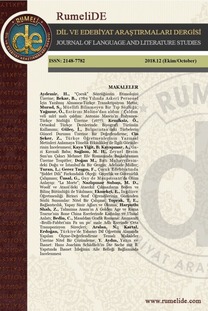Aldous Huxley’in Ada adlı romanında ideoloji ve özgürlük
Bu çalışma, Aldous Huxley’in bir ütopya düşünü
olan “Ada” isimli eserinde yansıtılan
özgürlüğü ve bu özgürlüğün devamı için dayatılan ideolojik aygıtları
incelemektedir. Bu özgürlük algısının neden çıktığı, çıkmasına nelerin etki
ettiği ve neye ulaşılmak istendiği gibi sorular incelenmekte ve romanda çeşitli
güç mekanizmalarının etkisiyle oluşturulan ideolojik aygıtların özgürlük
yanılsamasına neden olduğu tespit edilmektedir. Bu özgürlük yanılsamasının
ortaya çıkmasında bireylerdeki psikolojik sorunların ne gibi etkileri olduğu da
incelenmektedir. Bu romanda özgürlüğün seviyesi insanların mutluluk
seviyelerine göre düz orantılı olarak artmaktadır. Başka bir ifade ile
insanların korkularından kaçmaları ve onları mutlu edebilecek etkenlere
yönelmeleri sağlanarak özgürlüğün yolu açılmaktadır. Bu etkenlerin ortaya
çıkarılmasında ideolojik aygıtların kullanıldığı görülmektedir. Din, öz
işlevinden uzaklaştırılarak, toplumu istenilen şekle getirebilmek için
kullanılan bir aygıt olarak görülmektedir. Dini kendi çıkarları için kullanan
mekanizmanın varlığı ve amaçları tespit edilmekte, kendi özgürlüklerinin
gereksinimi olarak gücü elde etmeleri ve bunun için çeşitli ideolojik aygıtlar
kullanarak toplumu gerçeklerden uzak tutmaları gerektiği çıkarımları ortaya
koyulmaktadır. Ayrıca olguların zıttı ile var olursa tam anlaşılabileceği
öngörülmekte, buna bağlı olarak da toplumsal bilinçaltını bastırmak için
ideolojik mekanizmaların kullanıldığı anlaşılmaktadır. Korkularından
uzaklaştırılarak sadece mutluluğa yönlendirilen toplum böylece öz benliğinden
de uzaklaşmakta ve farkında olmadan oluşturulan sistemin bir uygulayıcısı
konumuna düşmektedir. Tüm bu nedenlerden dolayı sunulan gerçeğin kendi haz
duygusu olduğunu sanan birey, bunu sağlayan ideolojik aygıtlara bağlanmakta ve
özgürlük yanılsamasına düşmektedir.
Anahtar Kelimeler:
Aldous Huxley, Ada, ideoloji, özgürlük, ütopya
Ideology and freedom in Aldous Huxley’s novel, Island
This study examines freedom expressed in Aldous
Huxley’s Work Island and the
ideological methods imposed for the continuity of the freedom. The questions
such as why the idea of freedom has appeared, what has influenced it and what
the goal has been, are discussed and it is found out that the ideological
instruments designed with the impact of the various power mechanisms in the
novel, cause illusion of freedom. The effects of the psychological problems of
the individuals over occurrence of the illusion of freedom are analyzed as
well. In this novel, the level of freedom increases in accordance with the
happiness of the people indirectly proportional way. In other words, the way of freedom is opened
by offering people to rescue from their fears and lean to the factors which may
content them. It is seen that the ideological instruments are used in revealing
these factors. Religion is gotten off its essence and is seen as an instrument
used to put the society into the form desired. The existence and the goals of
the authority using religion within their benefits are determined and also it
is propounded that they need to gain the power for their own freedom and keep
the community away from the realities by using various ideological instruments
in order to reach their target.
Furthermore, it is predicted the phenomena may only be understood with
their opposites, and in parallel with this it is seen that the ideological
instruments are used to suppress the social sub-consciousness. The community
leaned to just the happiness by getting distracted from their fears, get
estranged from their own identity and end up in the position of becoming the
practitioners of the system set up. Due
to all of these reasons, the individual thinking the presented reality as if it
were his/her own pleasure, adheres to the ideological instruments providing
this and falls into the illusion of freedom.
Keywords:
Aldous Huxley, Island, ıdeology, freedom, utopia,
___
- Eagleton, T. (2011). İdeoloji. Muttalip Özcan (Çev.). İstanbul: Ayrıntı. Hirst, Q. P. (2014). Althusser ve İdeoloji Teorisi. Can Şahan (Ed.) İdeoloji Üzerine. Can Şahan (Çev.). İstanbul: Pales. Hitchcock, L. (2013). Kuramlar ve Kuramcılar. Seda Pekşen (Çev.). İstanbul: İletişim. Huxley, A. (2015). Ada. Seniha Akar (Çev.). İstanbul: İthaki. Mardin, Ş. (2015). İdeoloji. İstanbul: İletişim. Özbek, S. (2011). İdeoloji Kuramları. İstanbul: Notos. Williams, R. (1990). Marksizm ve Edebiyat. Esen Tarım (Çev.). İstanbul: Adam.
- ISSN: 2148-7782
- Yayın Aralığı: Yılda 6 Sayı
- Başlangıç: 2014
- Yayıncı: Yakup YILMAZ
Sayıdaki Diğer Makaleler
Onaltıncı yüzyıl Osmanlı anıtlarının modern İngilizceye çevrilmesine dair bazı düşünceler
Selim İleri’nin Hepsi Alev romanında bilinç akışı tekniğine dayalı dil ve anlatım özellikleri
“Hayat efsaneyi tekrar eder!”: Orhan Pamuk’un Kırmızı Saçlı Kadın adlı romanına Jungçu bir bakış
Gotse Delçev (Nevrokop) Türk ağzında ünlü uyumlarına aykırı gelen tipolojik durumlar
Zehra ŞAFAK, Mertcan BİLGİNSOY
Refik Halit Karay ile sürgün kadın kahramanlarının ortak özellikleri
Geçmişin çeviri yoluyla anlatısında güç mücadeleleri
Frédéric Beigbeder'nin "Kuzey Kulesi 107. Kat" adlı romanında postmodern unsurlar
